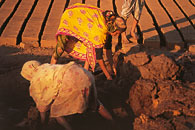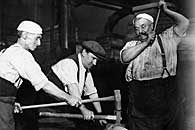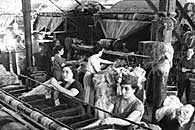|
|
Guidelines for Session Organizers
Session organizers are responsible for the content and quality of their sessions. To assist them in their task, the Executive Committee of the International Economic History Association (IEHA) suggests a number of guidelines to be followed when organizing sessions for the Utrecht 2009 Congress.
The congress will last for five days. Each day will be divided into four time blocks of 90 minutes (two before lunch and two after lunch). Each session organizer will be given two time blocks. Time blocks will be consecutive on the same day unless the organizers request an alternative timing. No extra time blocks will be allocated: organizers wishing to extend their session have to submit a proposal in the Second Round.
A detailed time schedule for the congress will be available in April 2009.
A tentative list of participants should be available for publication on the website before 1 November 2007.
For all sessions a final list of participants and paper titles, a time schedule for the session, and the congress papers or abstracts must be submitted before 31 May 2009, for publication on the Congress website. Scholars and the general public will have access to the website and will be able to search, read, and download papers of interest in advance of the Congress.
The IEHA wants to enhance the quality of the congress proceedings as much as possible, and therefore encourages session organizers and chairpersons to plan their sessions carefully and well in advance. We would like you to think about the following issues.
Golden Rules for enhancing the quality of a session:
- Evaluations of previous congresses have shown that participants often feel sessions are overcrowded and leave too little time for discussion. We therefore suggest you plan your session to allow at least 25 percent of the available time for open discussion with the floor. In order to achieve this goal, we suggest you choose one of the following options:
a) You can decide to limit the number of papers to be presented to 8 or 10. Assuming presentations are kept to the point, this will leave you enough time for questions and discussion, if clustered in a sensible way.
b) If you feel your session would profit from a larger number of participants, it is simply not possible to have all of them present their papers at the session in the traditional way. Instead, a commentator can briefly summarize the individual contributions, perhaps supplemented by a short reaction of the authors, and followed by a general discussion on a number of previously selected issues. This approach requires extra attention for the timely availability of all papers on the congress website.
No doubt there are alternative ways of organizing a large session that do justice to both the contributions of the individual participants and to the desire to have a good general discussion: the congress organization is open to suggestions you may have on this issue.
- Despite the need not to overcrowd your session, we want to encourage you to make an open call for papers on the congress website, in order to give young researchers and researchers outside your own circle the opportunity to participate in the Congress.
- Ask the participants (including chairpersons and commentators) to meet in advance, for example during lunch or dinner on the day before the session will take place. Make sure that the papers presented in your session are available to all participants well in advance, preferably through the congress website.
- Make a balanced plan of the session, including a clear timetable: how much time will be allocated to the presentation of papers, how much to comments, how much to questions from and discussion with the floor. Discuss the plan in advance with your co-organizers, chairpersons and paper presenters.
- See that all involved obey the rules; it is not unusual that people try to take more time for presenting papers than is allocated to them. Think of ways to deal with this problem in a flexible and friendly way. The congress organization will distribute three cards which may help you carry out the necessary symbolic acts when scholars go beyond their time limits: a yellow card (FIVE MINUTES), an orange card (ONE MINUTE), and a red card (STOP NOW).
- Think of ways to deal with language problems; not all participants may be fluent in English, which is the language usually spoken in the congress. Find out, well in advance, who may have problems in communicating in English. See that the chairperson is fluent in all languages that may be used in the session and can help to translate questions or answers. Often the best ways to overcome language problems are the same which make all presentations easier to digest and more enjoyable to follow: the use of summaries containing the most important points of the presentation, plus relevant graphs and tables, distributed as handouts or (preferably) as slides.
- Think of ways to create a positive incentive structure and to stimulate the kind of international, scientific exchange that is vital to these congresses. It is especially important to encourage young scholars: give them detailed comments on their paper (and on their style of presenting it), bring them into contact with 'established' colleagues who are also present, give them advice about the possible publication of their paper (for example, about the submission to a specific journal you know well).
- Do not forget to ask the contributors what technical aids they need in their presentation. Powerpoint facilities and capitalization assistance services will be available in all congress rooms, but if anything else is required, contact the congress organization in good time.
Make sure powerpoint presentations are copied to the pc in the congress room before the session starts.
|









